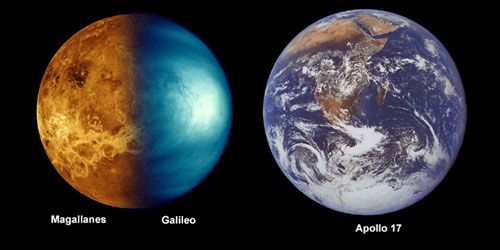
According to Space.com, Venus and Earth were really quite similar, until something went wrong. Horribly wrong.
I saw a Space.com article today entitled, Can Venus teach us to take climate change seriously? While Space.com writers should know quite a bit about the other planets, the article was a fount of misinformation and gross exaggeration.
The obvious purpose of the article was scare us into taking increasing carbon dioxide levels seriously, following on the Fourth National Climate Assessment (NC4) report (which I’m still trying to digest). After repeating the NC4 claim that “10 percent of the U.S. economy could evaporate by 2100” due to climate change, the Venusian silliness begins:
…a nearby world has an even hotter climate problem than ours, and scientists say we could learn some valuable lessons from it. That world is Venus, Earth’s “evil twin,” which was once nice enough until something went wrong and the atmosphere began trapping a little too much heat.
First of all, it is extremely speculative to claim that the climate of Venus “was once nice enough“. Then to further claim, “something went wrong and the atmosphere began trapping a little too much heat.” This makes it sound like Venus was just another hospitable planet until it reached some tipping point and a runaway greenhouse effect ensued.
This kind of prose might be good for science fiction, but it does a disservice to the facts.
While it is true that the surface of Venus has a temperature around 860 deg. F., the fact is that Venus has over 220,000 times as much CO2 as Earth’s atmosphere!
By way of comparison, since the Industrial Revolution started, it is widely believed we are now approaching 1.5 times as much atmospheric CO2 as we had hundreds of years ago.
220,000x versus 1.5x. Do you see the grotesqueness of comparing Venus to Earth?
If we used distances to make the comparison, and 1.5x was 1.5 inches, then 220,000x would be 2.3 miles! Imagine that the water level in the ocean increased by 0.5 inches, and people were trying to scare you about what might happen if it goes up another half an inch in the next 50 years by comparing it to 2.3 miles of water depth.
To make matters worse, the article then builds upon this Venus-is-so-much-like-Earth theme with the supposed reason why Venus is hotter than the Earth:
Much of the appeal of Venus comes from the fact that despite its horrifying modern appearance, it’s actually really similar to Earth. “Picture a planet that’s just like Earth but it’s a little hotter because it’s a little closer to the sun and that would be Venus,” David Grinspoon, a planetary scientist and astrobiologist at the Planetary Science Institute, told Space.com.
Wrong again, Dr. Planetary Scientist.
Because Venus is perpetually cloud-covered, it actually absorbs less sunlight than the Earth, even though it is closer to the sun. Were it not for its extreme greenhouse effect, its surface temperature would actually average colder than the Earth.
Using Venus to scare people about increasing CO2 levels on Earth is nothing new. But I’m surprised that a reputable website like Space.com would stoop to such a level of pseudo-science to support reductions in greenhouse gas emissions.

 Home/Blog
Home/Blog



